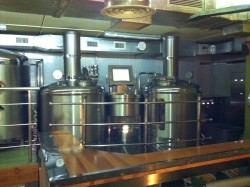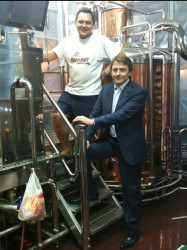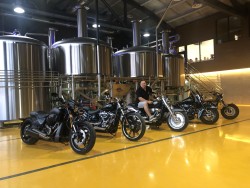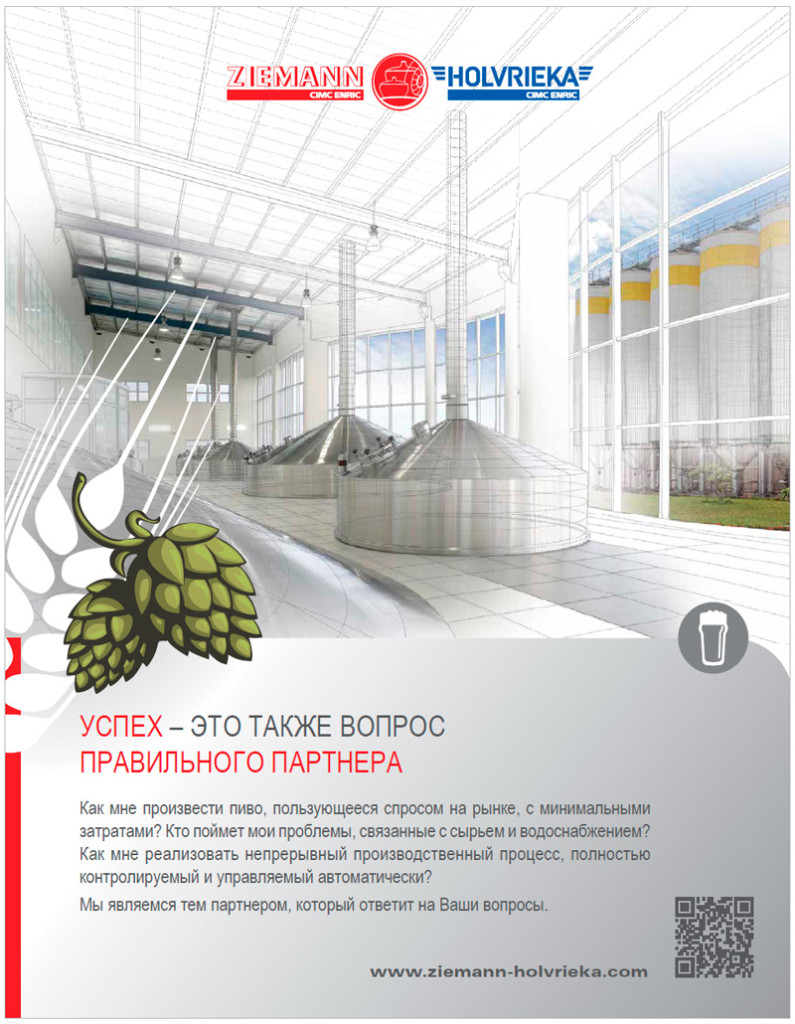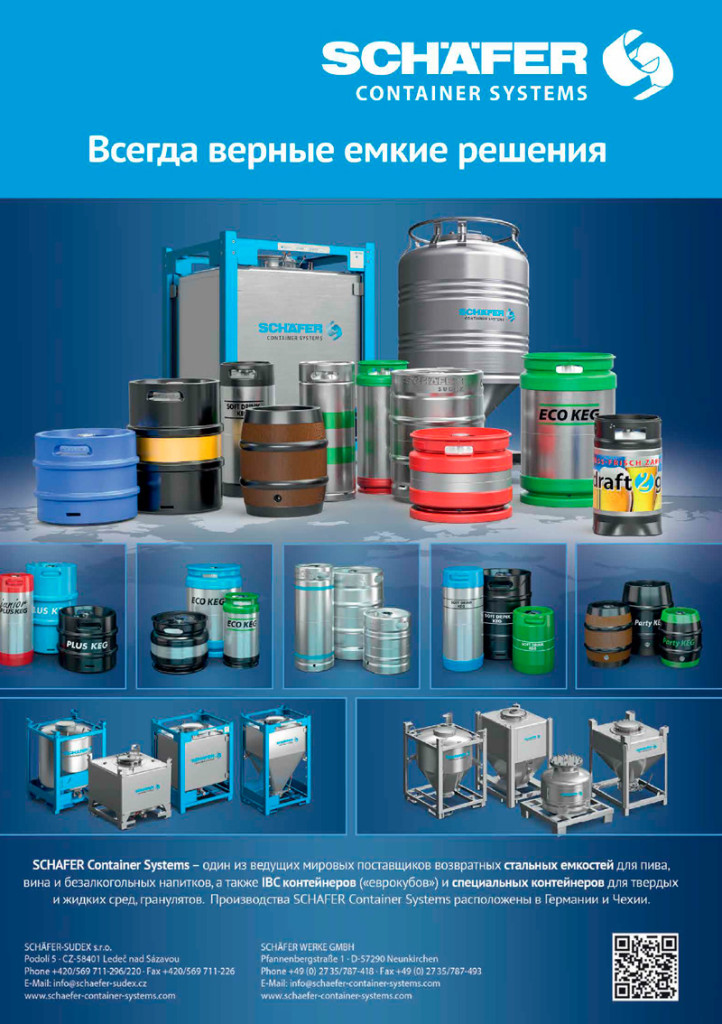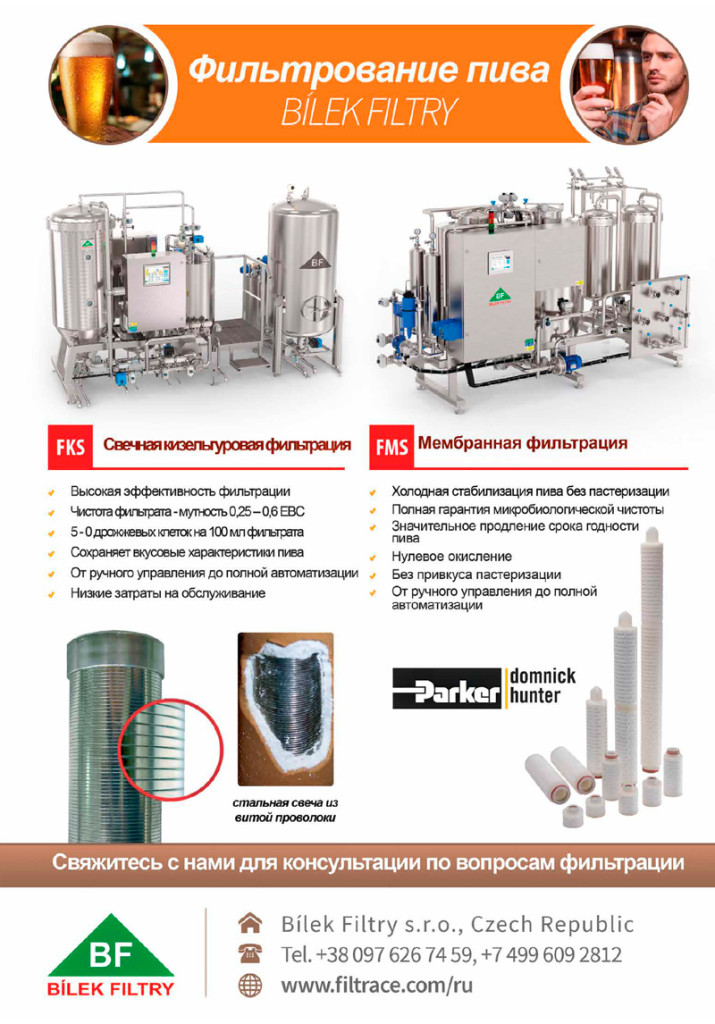A meeting with Dmitry Nekrasov always turns into a training course: “Introduction to brewing business“. We are talking to a clever “playing trainer“ a person that can be called a godfather of the Ukrainian craft. He has a dozen of successful projects to his name. Dmitry told us about craft beer in Ukraine, on market cycles, on specifity of operating in retail and HoReCa, on union of Ukrainian brewers and certainly, how a brewery of his own, First Dnipro Brewery is doing.
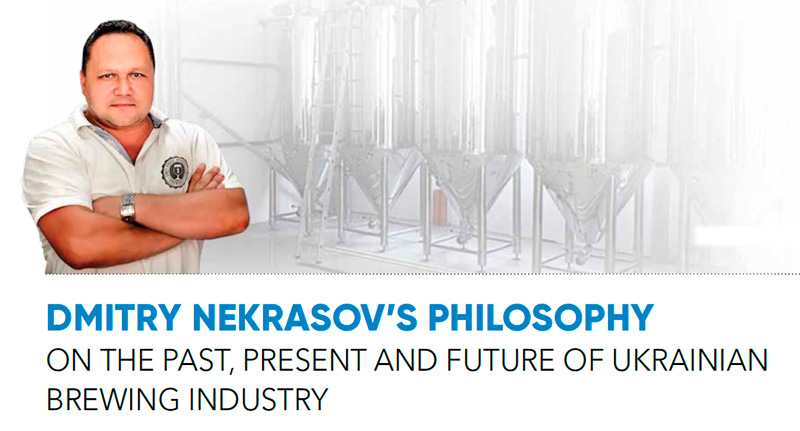
Dmitry, you have already become a guru for Ukrainian brewers’ union as you have launched several projects, have been sharing your experience and taking part in collaborations… I wonder, how do you manage to combine in yourself a business owner, experimental brewer and a public activist? Don’t you have troubles with all these identities’ conflict?
No, all these roles are interconnected now. My skills and each of these professions I was gradually mastering in difficult conditions by different life situations. At first, I worked at a trade company and learnt the principles and mechanisms of beer sales. Afterwards, I ran a small cafe of my own, Dobriy Shubin, which transformed into a barrel house with microbrewery, so there arose a necessity to brew beer of my own. Having a great experience both in business and in output, I helped new entrepreneurs to avoid stupid mistakes as they launched their projects.
Between creating Dobriy Shubin in Donetsk and Fanatic Brewing Center in Dnipro, I took part in I dare say more than 20 startups. Geography is from Ukraine and Russia to the USA. And every time I had a desire to exceed myself, to do climb the next step.
Do you see yourself more as a brewer or an entrepreneur?
I’d say in the first place I’m a technologist. I’m interested not so much in beer brewing as the brewing technology. Modernization, perfection and updating the existing process.
Is it much more difficult than brewing beer by ready-made recipes?
Actually, in the brewing technology there are a lot of unknown quantities. As you start reading new researches, it turns out that everything is based on experiments, observations and hypotheses. So, you need knowledge, hands-on experience, and sometimes ability to take risks. This is not always easy, but definitely interesting!
Is it important to read a lot and observe scientific literature in the course of you every-day operation? Or is it your personal wish to know the technologies perfectly?
Technologies are developing at such a speed, that, if you do not follow, you are behind, and if you do not implement them you are backing down. But for me development is important. As you strive for something new, professional passion enlightens in you. Certainly, it is something impossible to find time to learn all aspects at the same time. In the first turn I clear the issues that need to be solved at the current moment, I find the special literature and get to the essence of the issue. But each time at the International exhibition of production and package technologies for beverages BrauBeviale in Nuremberg, I find new segments interesting that were not so important for me before.
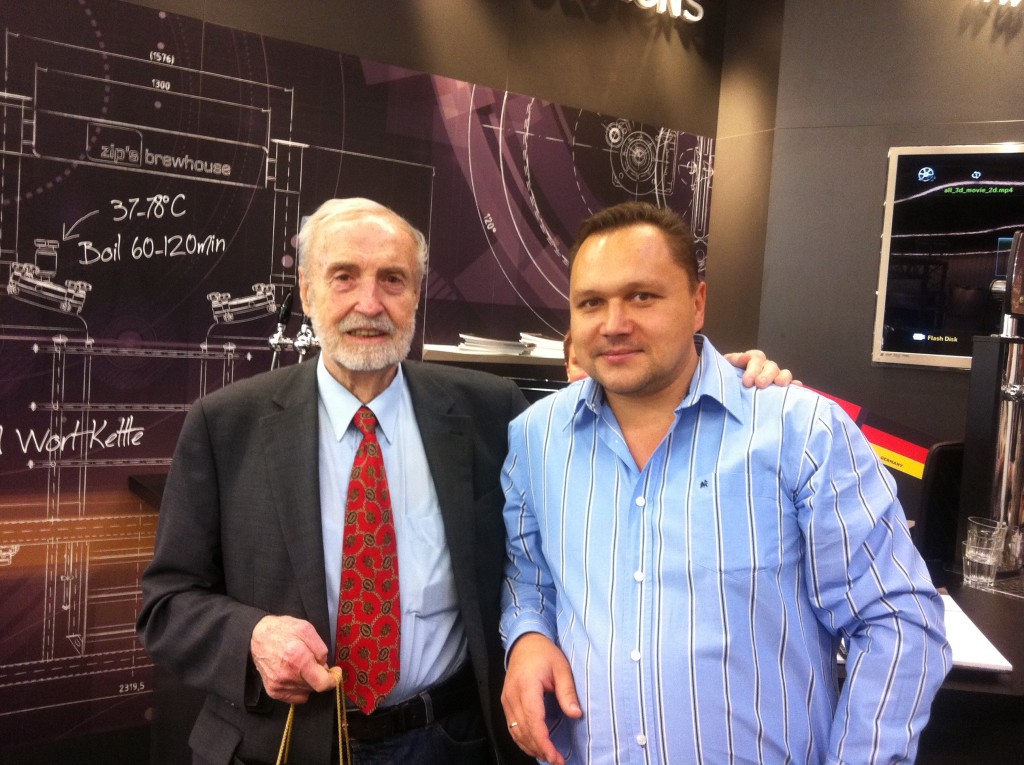
Have the approaches changed much since you started brewing beer?
Honestly speaking the approaches have remained mostly the same. But when I started, there was not enough of necessary information. I did not have an idea how to make the operation more effective and looked for solutions by cut and try method. Currently, everything is different – both with information access and with possibilities. For example, the process of automatization and computerization is getting cheaper, there are new methods of work with ingredients, the logistics inside the brewery is changing as well as means of analysis and control of all these production stages.
I also change and grow as a specialist, I can see new horizons, and follow the technologies. Breweries under my control (as well as businesses I launch) increase their capacities. The sales geography and the product range are getting wider, the market is demanding something new.
The majority of brewery leaders have some background in HoReCa, distribution, sales, and investments…Do you know people who came to the beer business from home hobby and operate steadily?
There are home brewers who have become industrial brewers. But if we speak of substantial business in economical aspect, I’d say I can not give you such examples. Still, you need to be a successful businessman to become a successful manager in brewing business. And the best projects are those where the business owner (as I at my time) goes to the wort boiler and starts making beer.
I know people who are trying to start something today, but it is too early to talk of their success now. Perhaps it is also a difficult time now…2007 when I started, and 2019 are absolutely different conditions for starting.
Was it much easier then?
Of course! At that time the market was growing rapidly. The beer price given that purchasing power was much higher. In my view, the current beer price for the final consumer is too low. Then, there were favorable conditions for development. However, as early as in 2008, when dollar went up, those conditions could not be called overprotection. Yet the loan requirements were milder, and the space for decision making was wider, there weren’t these crazy interest rates.
Today not every brewer beginner can pull off the load of price for decent brewing equipment. That is why beginners buy cheaper equipment and face difficulties they could not foresee. Too soon they have to deal with the technologies of constructional materials and welding seams, questions on quality of pumps and layers, while it does not pertain to the brewing technologies directly.
You mentioned troubles of 2008, but in late 2013, when you became a co-owner of First Dnipro Brewery (FDB) it was even more difficult… How did you resolve to take part in a project?
Did anyone in 2013 could predict what would happen in 2014?
This idea actually appeared at the beginning of 2013 and it was a prepared and not a spontaneous decision at all. I met guys from Dnipro co-owners of store chain More Piva, I got to know their business. I liked their view on beer and approach to the drink sales. They got an idea of construction a brewery in Dnipro. I realized that given a well-tuned up distribution of their own (a chain of specialized stores) plus my experience of setting up mini-brewing businesses the project was doomed to success. So I got talked into it. We had a deal and started visiting exhibitions looking for equipment…
Suddenly, these guys learned that there was a brewery for sale in Dnipro with equipment by a producer I knew and had had business with since 2007. A strike of luck? Only on the one hand. The brewery was in dead-alive condition, but we had a dig at its recovery. As soon as in 6 months the first brews started.
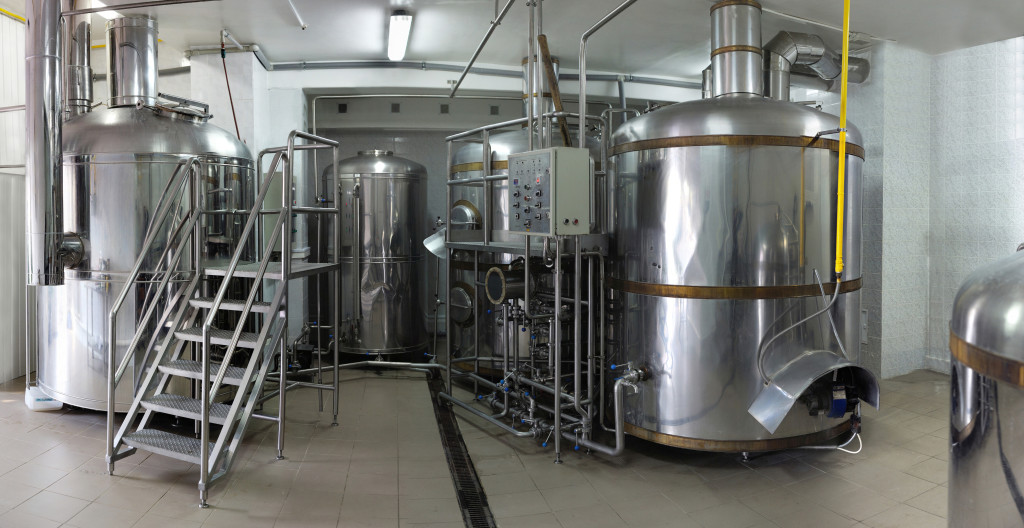
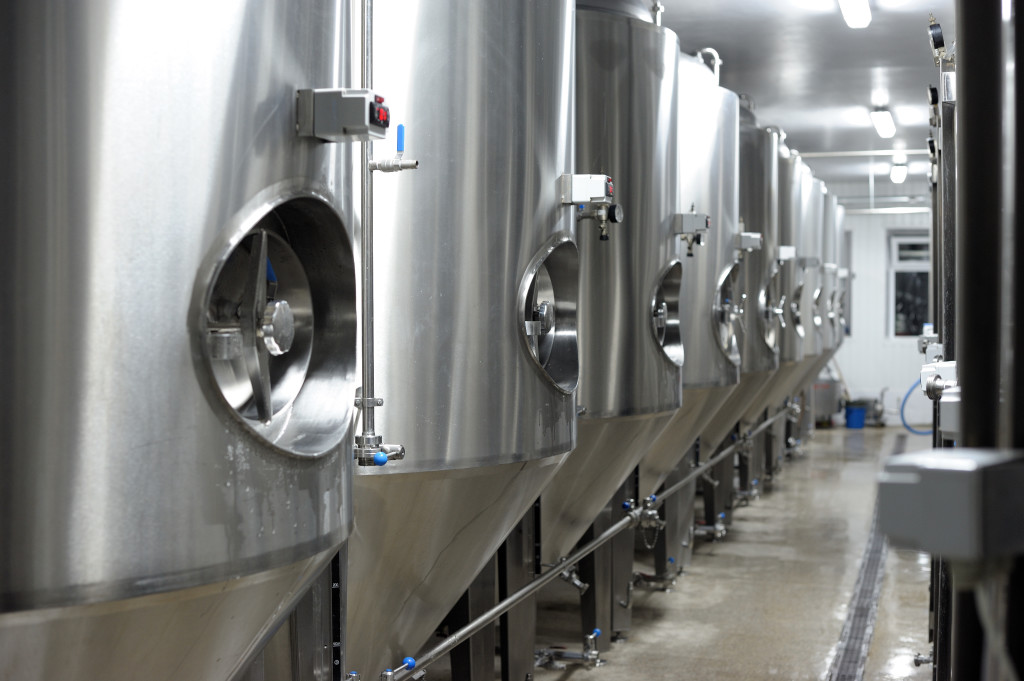
The plant started operating at the moment when there began an intervention into our country, military and economic crises. The situation was even more complex as I was also a part of a project in Donetsk and was pinballing between one city and the other. In 2014, it became clear that me and my family needed to move to Dnipro.
Did you manage to do most of the work and investments by that moment?
No, we did not. We still had loans on the plant. In 2015, banks were cracking and the dollar rate was growing – in general the situation was depressing. It was very hard to go through this, but one difficult step took us out. At some moment we decided that our beer would cost more than others’ product. We raised the price to the minimal level for us to make the ends meet. From that on it has been easier.
But in 2015 people started buying was cheaper and looked simpler (the share of Zhigulevske was increasing). And the beer market was falling, while the premium segment was shrinking. How did you pass that stress test?
We realized that if we had not raised the stakes, we would have just gone broke and it would be the end. Our incomes did not even allow us to pay interests to banks. But as we increased our prices, we saw prices of other stores rise too. Our neighbors picked up the initiative and this step was absolutely right. Perhaps, the reaction was so fast, as everybody was looking to the chain More Piva as at the market leader.
More Piva is not only our partner, but also a co-investor of FDB, isn’t it?
We are loyal to each other, but none of the businesses belongs to the other. These are 100% separate organizations, I have no founding relationships with More Piva. If you look from outside, you’ll see two businesses that cooperate on an arm’s length basis. Our common decisions are often taken in difficult debates. But our business is closely connected as we have become strategic partners. We cannot do without More Piva and More Piva cannot do without FDB.
You trust each other completely…
Yes, at the levels of owners. There are some changes at our market all the time. There are some plants that go to other competitive chains or a chain can find a more promising producer… But our view of strategic partnership means that no matter what disputes we have, we will anyway find a compromise and make an agreement. Any unfriendly steps behind each other’s back is excluded.

But each chain has a certain coverage by outlets and a geography of its own. If you decide to develop in some other cities or channels, do you have to widen the range of your partners?
We structure our trade relations by categories. We have stores of draft beer (chains) and restaurants. Among restaurants we single out the target HoReCa, namely, beer pubs and restaurants. This is about taps, but there is also bottle…
And speaking of the first category, stores, do you work with other chains or you have exclusive obligations?
Here one has to understand, that many chains knowing we work with More Piva, are simply not ready to cooperate with us. Nearly 80% of chain stores compete with More Piva and have a strong association between us, so they have, let us say, a cautious attitude to us. But there are chains we cooperate with nicely. They might belong to another price segment (a bit higher). But when we enter a new region, we are looking for a separate partner. Neither More Piva share their plans on entering some markets with us – this is their business. They make an order for us – how much beer for a month, quarter and year they will need…
If we speak of HoReCa, here we grow and develop new regions on our own. For example we went to several restaurants in Kherson, and in a month guys from a local trade chain came to us. We talked and made an agreement and they sell our beer now.
Widening of the range of contacts and geography is mostly taking part through HoReCa.
But the main direction does not mean that HoReCa is the basic sales channel by the volumes?
Beer stores are more important from this point of view. But HoReCa is an image channel which allows to do experiments, and make beer that is different from the mass sorts. HoReCa is very important for promotion, if for no other reason, than because a waiter will tell a guest about our beer and its characteristics. At a store, a salesperson simply does not have time to speak to clients telling them about products being busy with so many clients.
That makes HoReCa the major channel also because you have to spend much time on working with partners, doesn’t it?
I in the first place, focus on perfecting technologies and the brewery expansion. Sales are currently not my task. This is the job of trade department team. They really invest a lot of time into HoReCa. This is also necessary for launching a new beer sort as well as “feedback” one has to listen, to hear and take the consumers’ reaction into consideration. But this is also interesting as It takes you out of monotonous routine.
We provide more than 300 restaurants with beer. An this is not the bulk of volumes, yet restaurants play an important role for representation.
The figure 300 impresses! As I understand, most of restaurants are concentrated in Dnipro, and its coverage is less the farther it is from Dnipro.
Yes, certainly. It is obvious that at first we entered HoReCa, where More Piva operates. This a synchronized process: people buy beer at stores, and then order it at restaurants. And vice versa: they taste it and then find it at shops. We are best represented in Dnipro and Kiev, and we have some coverage on the coast – Kherson, Odessa and other cities.
One should say that restaurant geography is getting wider and changes all the time. This is logical as restaurants have to update their range and in order to surprise guests. That is why we have our finger on the pulse and always offer new sorts and pay attention to those having popularity. And we never set such conditions as exclusiveness, we do not have these ambitions.
What advantages do you offer? Or the restaurants come to you anyway?
Restaurateurs observe the trends, if they do not want to close their restaurants. That is why they come to us, ask about our craft, and the sorts we brew. As we start building business relations, we tell waiters and barmen about product and tell how they should work with it. The fact that we produce not a mass product but exclusive one, as well as the quality we provide, grants us long-term cooperation with beer restaurants.
Our trade division fulfils the bulk of work connected to looking for restaurants/pubs. One should not forget about social networks, Facebook was and still is a wonderful business platform. It is very easy to find both me and First Dnipro Brewery account where there is new data on which sorts are launching, one can always get in contact and start cooperating.
I can see that major restaurants prefer making agreements with beer giants. Beer will be cheap, (they will be close to even pay you) plus image and technical support: TV ads, POS-materials, fridges…
You are right. Yes, we have contacts with major restaurant chains but we are not able to get there for the reasons you mentioned in your question: prices and the policy of beer giants who are ready to provide beer and discounts demanding exclusiveness instead. Every autumn, as contracts are concluded we hope to “hop into” restaurant chains, but no. We have a way too big difference in money.
I noticed that you are actively taking part in events, awards conferences and HoReCa…
As for specialized HoReCa (pubs and beer restaurants) we often meet at festivals, restaurants events and forums. Besides, restaurants premium Sol, invited me to be a jury member three years ago. I travel all over Ukraine, go to different pubs and restaurants and assess them.

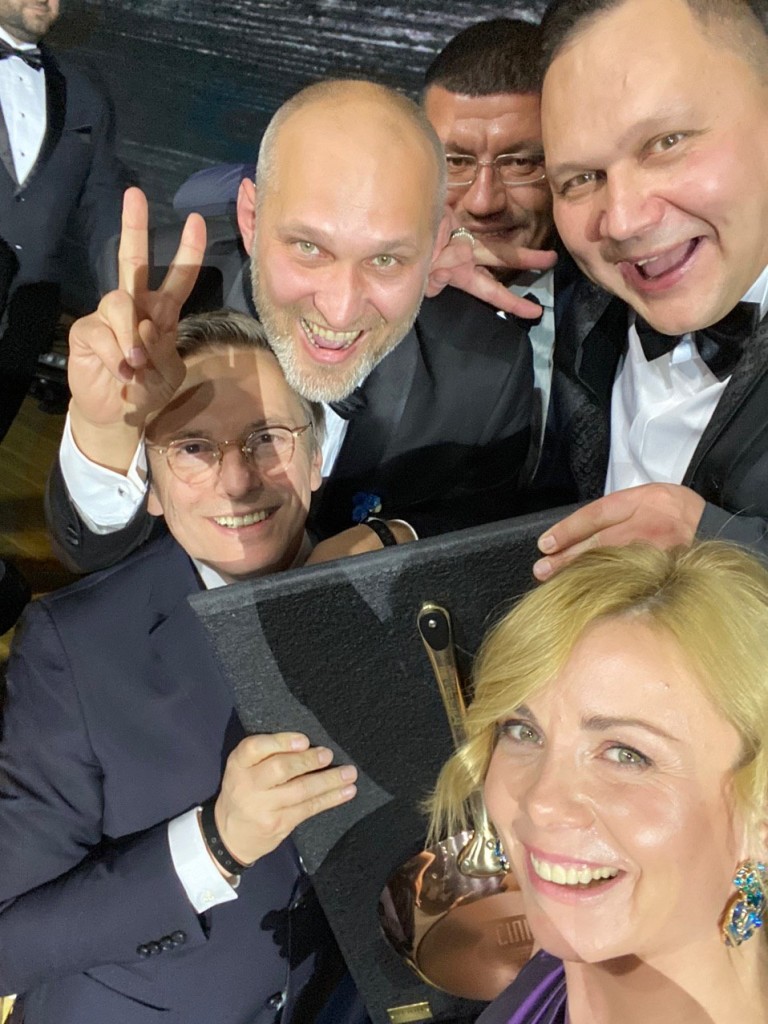
Does such activity help to enter the restaurant wing-ding and bond ties or there are other reasons for such activity.
For me it is important to see what is going on at restaurant market of the country, what formats are appearing, how they become successful, or fail. I observe different generations of businessmen, restaurant owners, consumers, understand how different we, our views, and our wishes are. All this must be taken into consideration when we offer and sell the product. Conservative approach of Germany doesn’t work here. There a brewery can exist for 150 years and does not change all this time. Over 150 years, this brewery is visited both by old and young people (according to traditions or a habit). In Ukraine that is absolutely different. However, in Germany too changes are likely to take place.
You mentioned that you recommended certain beer sorts to restaurant owners. How prepared are they to form their range on their own and tell you what beer they would like to see? May be they want to adopt your brands or give them their names?
Yes, though we always have a good variety, 10-15 sorts of beer, almost every restaurant owner asks “Can you brew an exclusive sort for us?” We have a ready-made offer for such cases, but usually it is not advantageous for the restaurant in the first place, because our minimum brew volume is 1200 liters, we cannot make less. It will be a pure exclusive sort, but not every restaurant can sell such a volume. Instead, it is advantageous and interesting for big companies like More Piva.
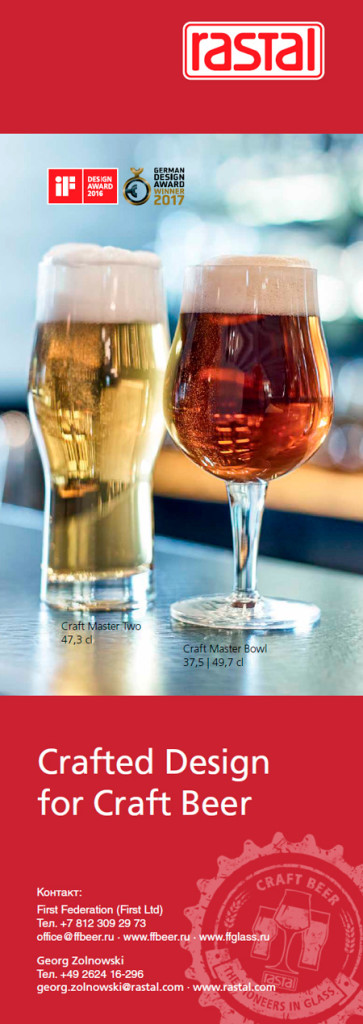 Do you offer any follow-up materials, equipment and other stimuluses (that beer giants are famous for) or just beer?
Do you offer any follow-up materials, equipment and other stimuluses (that beer giants are famous for) or just beer?
If it is economically grounded, why not? I admit, I used to be strongly against such methods. Then I realized that if we want to be successful and if such decisions pay off, we have to be ready to provide equipment.
In private communication I always advise partners to buy equipment (it is not so expensive) and learn to give service to it in order to keep independent in forming their product range. For example, when you rent coffee machines for coffee shops, you oblige yourself to the work with the renter and compensate his costs by buying his coffee.
Likewise, we are ready to give equipment for rent if a client will sell a certain volume of beer. Restaurants working at such conditions are scarce. But we still do not offer kickbacks or concealed financial stimulus in the form of bonuses or other compensations because we want to be honest with partners and work with everybody at equal conditions.
Your beer is sold not only in kegs but also in glass bottle, though a lot of other plants (including bigger ones) work only with draft. Did such step help to widen your distribution? What economic grounding did it have?
To start with, a bottle is presentable and unique due to the label.
The second advantage of small glass package is the chance to deliver the original taste of beer you brew to the consumer. It is more difficult in kegs and for some breweries even impossible as the taste is connected to ‘go-betweens’ – quality and cleanliness of the system of filling the legs, to hygiene at the brewery, including the system of keg washing.
The third moment – we started taking part in festivals where we wanted to present 30-40 sorts of our beer. You cannot get so many kegs for tap. So, for distant events we started packing our beer in bottle. It was an advantageous decision for us and an interesting and handy package for fest guests.
The bottle lets us enter some restaurants. Especially in cases when they have only 2-3 taps or have some obligations to the equipment owner (provided there is no agreement for exclusiveness). 3-5 bottles of each FDB sort help to diversify their beer menu. This is good both for the restaurant and guests. And we get bigger possibilities for cooperation.
Besides, searching for new formats, More Pivo got excited by out bottle too. Now one can find the regular FDB range in their fridges and windows.
Certainly, with glass production we’ve got additional responsibilities – beer lifespan and stability. Glass package is much more difficult technologically than kegs. It gets warm faster, beer is affected by sun rays and air when it is filled in a bottle…
You are known as an innovator, there was a time when FDB “shot” a new eye-catching extremal, unusual sorts every week. How do you form your product range?
The story with lots of launches has been going on for more than three years and it has been changing over this time. Thus in 2015, a project of creating one sort per week was started. 52 sorts in one year! The point of this project was to let our country know about different sorts of beer and make beer lovers understand how various it can be. That wasn’t easy. When we started, we did not know how we should brew many of those sorts, we didn’t know how one should work with some materials and American hops, we still had to learn cold dry hopping, and we had to practice.

And we took risks only due to support from store chain More Piva. The project was subsidized by 100%. We realized we would not be able to sell so much beer at the price that could let use get some profit. The cost price was high because of special and expensive ingredients. Besides, supplies of those components were not centralized, they had to be delivered from different suppliers. So, we made a deal with More Piva that each of us would subsidize the project from his side. Resulting from the experiments (very and not very successful ones) we got a productive experience, and More Piva won regular guests, necessary feedback and a reputation of a revolutionary chain with unusual and frequently undated beer.
After the sales analysis, we have singled out TOP-10 most popular sorts and now work on improving them. Besides we decided that the weekly launches of a new sort exhausted us and in 2016 we had only 12 sorts launching a new sort every month. Thus, we had time to work thoroughly on each sort and bring its taste to perfection. However, that speed turned out to be not enough, as consumers demanded new sorts more often. That brought us to the golden mean, where a sort appears once a fortnight. We have been working like this for two years but do not have so much experiments. We have set on launching the sorts that are interesting for us and understandable for people.
Can you share your conclusions based on this experience?
For instance, we so far do not like working with fruits. If you brew a ton of beer with them, you can process and prepare the materials well. But if you brew 10-15 tons, fruits will become a big problem starting from purchasing: you have to buy them at different places, accordingly, their quality will be different, so it will be more difficult to foresee the results of your brewing. One more detail – for processing so much fruits you need a lot of space. Besides, if there are deadlines, the quality of processing starts to suffer. And so on… Usually in such cases brewers start looking at ready-made purees and juices. But we found it not interesting. Besides, oversugared fruit tastes are on the one hand not something beer lovers are digging, on the other hand, such expensive ingredients raise the beer price too. So far, we have not observed a hike in sales or big interest from our main consumers. That is why if we continue playing around with fruits, but we brew a ton at a special order from some restaurant or brew a limited batch to a holiday, for example beer from pumpkin for Halloween.
While in the USA the bulk of craft is sold in Modern Trade, we have Draft in On Trade. Is it true that your craft beer is usually sold through tap together with “live” beer and Zhigulevskoe?
I have a nontypical attitude to craft beer. I consider it to be a marketing prefix which explains a consumer why he has to pay a little more: “Oh, yes this small brewery has a right for existence, as it is going to surprise us with something.” But I also like traditional lagers and pilsners created by small breweries that can be very qualitative, and do not go through pasteurization and stabilization. Is it not craft? However, I even do not have anything against pasteurized beer either.
Craft also means a trend among brewers. So, each of us can call his/her product craft. Consumers can take it well or not, and the brewer will decide whether he has to continue using this prefix.
Ok, there is special beer with unusual taste which costs more, should we call it craft?
No, craft beer is in the first place our attitude to the product. We now strictly differentiate between draft and “live” beer meaning that “live” beer is bad. Because too many shops selling it were discredited by incorrect attitude to beer as a product its way to be stored and sold. Selling obviously old and stinky beer, they killed off the excitement people had for them.
A small brewery outputting an ultrafashionable sorts and calling itself craft can lose its enthusiasm in a year or two as nobody is going to subsidize it. Brewer owner is going to make a simpler or even mediocre beer. But he will not give up his “craftiness”. So, we should single out more understandable criteria.
Why will brewer owner have to do it in the nearest future?
This is because it is generally getting very difficult to start a brewery and sell products at a decent level. The product range needs to have economic grounding and working only at craft, elite market is incredibly difficult. The business form might be adequate for a small restaurant brewery or a brewery with a distribution of its own in HoReCa. For this reason, in 2006-2007 we were for the first time able to taste special beer in restaurant breweries as it is the only 100% effective format. Today we can see breweries opening their own pubs where they promote their own brands. The only alternative is to look for the break-even point via simple, affordable and mass beer sorts. And there is nothing disgraceful about it.
It seems, there are not many lovers of “special” beer in Ukraine?
Yes, you are right. This market is only forming. It hiked two years ago and it impressed everyone. But why was there such a reaction? Because only yesterday there was practically no market of craft beer in Ukraine. And suddenly there appeared approximately 3% of population preferring this beer. The growth from zero to 3% looks great. But further introduction of craft will go in a very smooth curve.
Sociologists say that the youth drink less and less often, but pay more for their drinks. While people 35+ pay less for a liter, but drink more beer. Should craft brewers somehow “heat” the mass conservative consumer?
Again, what is “craft” in this case?
Let us say, heavily hopped sorts…
Young and old now likes heavily hopped sorts as they have been long present at the market. Certainly, the progressive youth were the first to develop a taste for it. And though, today everybody at 45 considers themselves young, the preferences transfer from younger to older people, who are not so easily involved into experiments, anyway.
But the main consumer is still the youth, isn’t it?
Yes, because by “craft” we mean something original. For many young people, IPA is not a craft any more, as they see it too often, and we can observe the “broken record” effect. And for somebody older, who is used only to three beer sorts, even a porter which he has just tasted, is craft. But in our environment craft is something new and experimental, so craft brewers want to surprise us, to blow our minds. Understandably is more appreciated by the youth.
Despite your views, you have done a lot for development of the craft market in Ukraine, haven’t you?
We promoted the development by helping a lot of people to become brewers the whole 2017. That was the time of contract brewing boom. And our brewery led the process for sure, because we offered at rather loyal conditions our productive base for beginners. Over the year, more than 40 contract brewers made their experiments. People were coming, going and coming back again.
My colleagues were asking me what I needed that for. I answered that there was no market and it was necessary to form it. In each of the contract brewers, I saw an ambassador of craft beer.
They learnt how to brew beer, bought equipment and what did you advise them then? What marketing measures work at the craft market according to your observations?
I advise the brewers to personally involve in the promotion and speak to people personally. They could only sell their beer only in case they came to a bar and spoke to guests there. Besides, by the way they always promoted the general idea of the craft beer consumption, opened the quests’ eyes to this. In general, there are rather many chances for communication they include tap-rooms, festivals and other events. Today it has become trendy among restaurant keepers to invite a brewer for a brand presentation at the restaurant or just real-life communication with guests who are interested in beer. I very often attend such events and notice with surprise that people gather even on Wednesdays – to listen, to talk and ask questions. Collaborations between brewers as well as communication at forums also attract attention to the “new wave of brewing”. And certainly, social networks… The only thing, one should choose those targeted at the result.
That is, the promotion should be based on a brewer’s personality?
There are different strategies. But product animation by the person who made it always works finely.
Despite the developed union of small-scale brewers, there seems to be a fierce price competition between them. And the prices for craft beer are not too high. What has been happening during the recent years and how is it possible to keep the market stable?
I have to admit I always feared it. I took part in many Russian breweries opening and I stay in contact with their owners. I saw what happened to communication between brewers from Saint Petersburg as they were going through the boom of craft market. That is why I did not want the same thing to happen here, I tried to act as a peacemaker to stop brewers from feuding with each other.
There was a very dangerous period because everything was evolving with fits and stars.
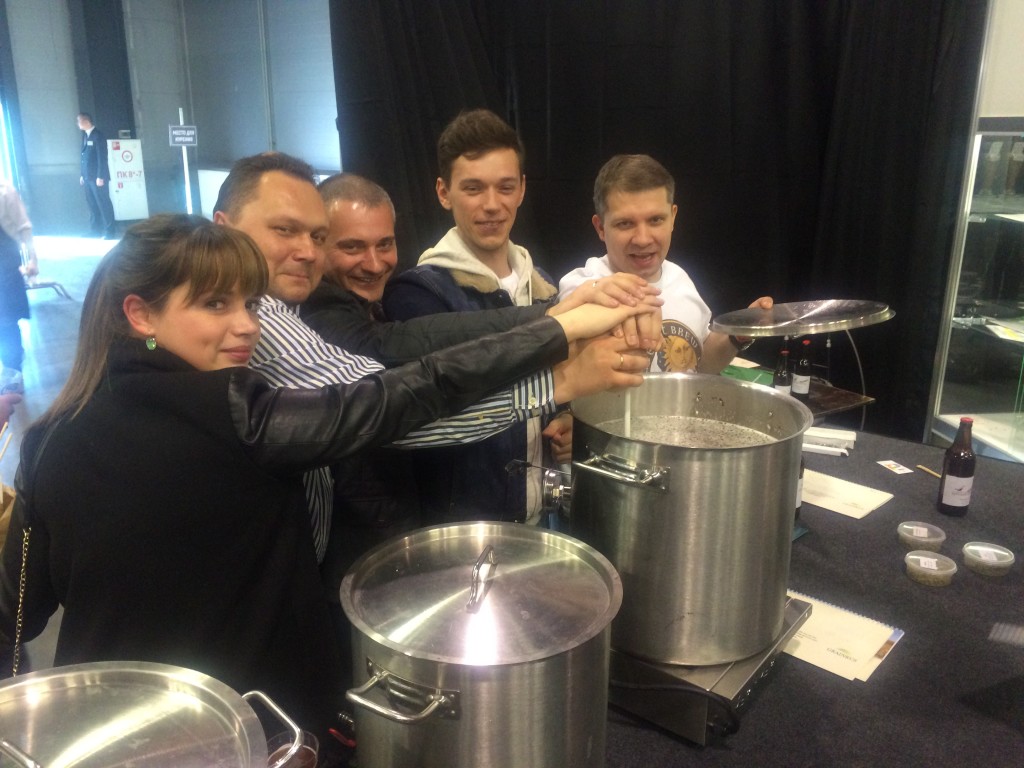
At first there appeared first craft breweries. Then craft pubs. And it turned out that in winter there was not enough of beer for those pubs. They tried to solve this problem, they called to all known breweries, but got refusal from everywhere as volumes had been agreed on before. At this moment, having seen a big market niche, many people started buying equipment and opening breweries, not thinking at all that they were not the only ones who saw the daylight. The number of craft pubs remained nearly the same, and the number of breweries multiplied. And bar managers started hiding from brewers and change the phone numbers as they did not want to say no to their fellows but realized they were limited by the number of taps. Otherwise they would have to explain why they bought beer by another brewery…
A really sad situation…
Yes, it was, and to some extent we still have the aftermath, as beer HoReCa still has not been saturated. At that moment, many brewers developed a grudge against each other. But it was a blessing in disguise. Because the project and breweries that were not very important for owners stopped operating.
Besides, that period provoked unprincipled pubs. When such a big supply appears, it is a sin not to take an advantage of brewers – to take their product on trust and not give them money for sold beer. As a result, there appeared private forums of brewers where they told each other of unfair market players. We started acting together, ignoring liars and not shipping beer to them. Certainly, such interaction promoted closer connections between us. Ukrainian brewers are surely still friendly.
And today, as we set the road to the brewing future, we need more pubs and we need them to be popular. This will surely happen if such format is economically grounded. We discussed this situation at forums even two years ago. And then we arrived at the common conclusion: “Guys we need to raise the price”. Luckily everybody started pulling up prices which became noticeable by 2019.
The situation in Kharkiv was especially interesting. That is a city with a developed beer consumption, it is not less important than Kiev, as there are a lot of young people. There is a big choice of restaurants and the production by different breweries. And all brewers oriented at the prices or restaurant breweries. And they for some reason persistently kept them at the level of nearly 2010. In such breweries everything got more expensive a long time ago, and a cup of coffee costs more than a glass of beer. It is surprising to see a price tag of 30 hrn for a glass at a restaurant that invested money into a brewery. As a result, there was no new restaurant breweries and the beer pubs lived in the conditions of fierce price competition.
Now the price has increased and pubs have a 150-200% markup which allowed them to gain profit. Besides, owners of many breweries realized that their survival depends on pubs of their own, so they started opening. We can see new pubs arising and we can speak of a new cycle of space growth for brewers.
That is, one can be satisfied with the fact that the market is gaining balance…
On our field everything is taking place too unevenly – first there are too many pubs and not enough of breweries and then vice versa. The market gets balanced in a spasmodic and very painful for us manner. It is not regulated by anybody, so we have to discuss a lot of questions and work together. That was one of the reasons why we decided to create an association.
So, it turns out your market segment is saturated and one should not expect new breweries besides some systematic projects?
No, perhaps there will be new breweries somewhere. I know that virtually all of us increase their capacities.
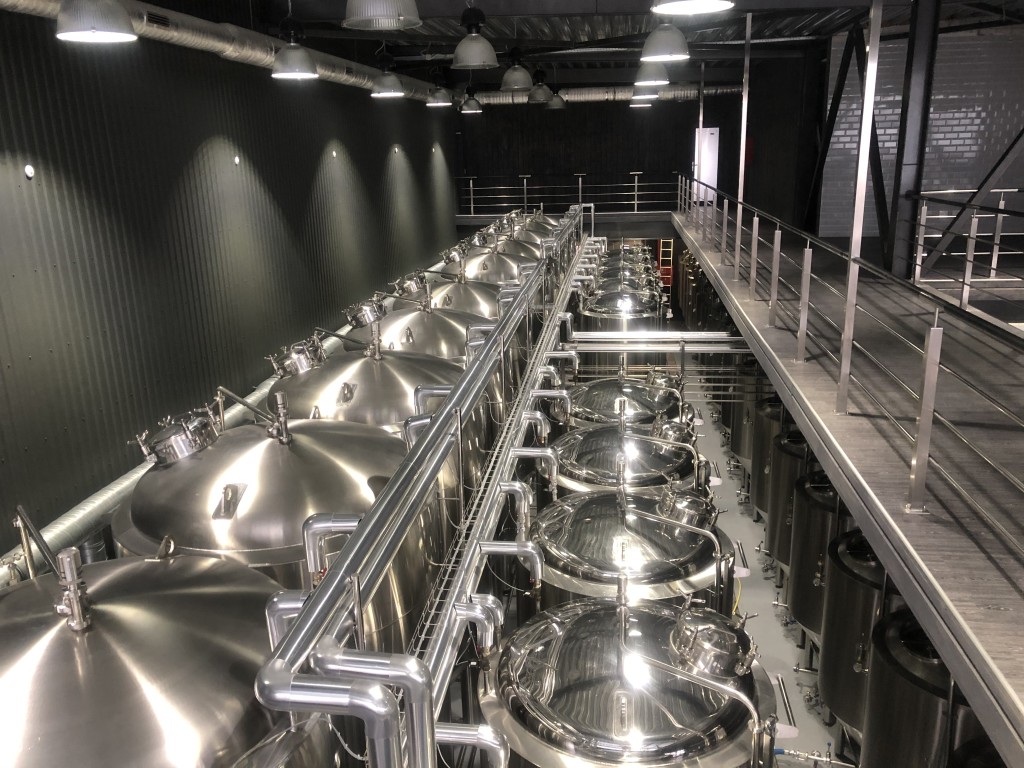
What I like about Ukraine is a wide geography of projects, not like in Russia, where the bulk of breweries are concentrated in Peter and Moscow. Here small brewing development is allocated over the regions, and it is correct. I think in distant places of our country there will be emerging small breweries, actually they already exist. Not only in million-plus cities but also in Sumy, Ternopol and other cities. I expect a counterrunning wave of development to come from there.
Yet, there will be no incredible expansion that used to be. We saw, say, a brewery from Zaporizhzhia shipping draft beer to Lvov. The attention of people is switching from distant regions to local or neighboring breweries. Now in Lviv and Kharkiv one can see how people protect and patriotically support their brewers. And perhaps this is right.
And how will the expansion of the pubs chain look?
There might be some new formats of establishments. And it is actually a separate creative profession and a talent to see a perspective view. And restaurant owners are often completely crazy people. I have recently been to Lviv and saw a very interesting form of pubs at Kumpel. Pravda is also demonstrating a lot of interesting things. Everybody has its own way of development.
Has anything changed for the better or worse due to new authority in regulation, fiscal load, inspections and so on?
So far, I cannot say I felt any changes of the pressure. But I was for instance glad to learn about the law on the alcohol regulation. We are looking to such deregulation. There probably will be small distilling businesses. Such small alcohol producers are common in the whole world. I would like to have a strong alcoholic product in our range especially if it is connected to beer brewing.
Somebody is looking with hope at the new authorities, somebody on the contrary. But economically most of brewers I know are optimistic about the future. We believe it will be easier and better.
How will you unite the brewers into association you have mentioned? It is good to be friends, but what are the official purpose for uniting – presentation in the authority, common events or something else?
This idea has been long in the air and will be soon officially formalized. The agreements are at the final stage. The essence of union is simple and practical:
To have its lobby, that would present our interests as an economy branch. Otherwise in the state structure nobody is going to take care of us.
To have a chance to help each other in brewing. Yes, we are competitors at the market but in production we are partners and friends. As I have said the brewing is not well studied and as we share the results of our experiments, we help each other to grow and our common business develop.
For the third thing, beside the inner competition, we have an outer competitor, namely import beer Foreign suppliers feel at home at the Ukrainian market, they are dumping and act destructively.
And in the future, when the participants trust each other to 100%, it will allow the association members to regulate the market and develop understanding which beer it needs.
There are a lot of thoughts and they are various. It is important that everybody supports the idea and wishes to enter the association. As soon as it is registered, we will see a lot of like-minded people and we will have specific plans and real tasks. We have been on standby in the process of registration for six months already.
And how do you see membership in this association of a certain brewery? Will it be necessary to pay dues, what requests will be set to participants?
At the beginning, there will certainly be no dues. There will be a principle “From each according to his ability, to each according to his participation”. We will work for the sake of the brewing art. In the future, there will be some dues probably, as not everyone to take part in this process.
The obligatory formal criterion for introduction will be a license and legal beer production – nobody has to be privileged. There will be limitations by the output volume. One more criterion, a more abstractive one, is the wish to popularize brewing, to develop taste in people and widen the ideas about beer.
Great idea! Thank you for the interesting conversation!


